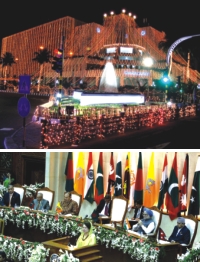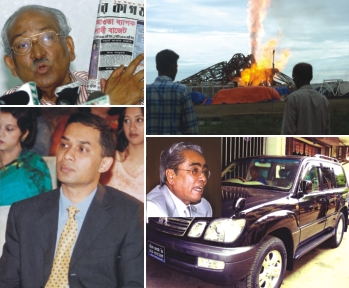|
Flashback 2005
Another Year in the Quagmire
Ahmede Hussain
If 2005 has any reason to be remembered by it is going to be the several suicide bombings that have left the country in a state of shock and awe. At the beginning of the  year bombs started to rip through in public places more frequently. In the first display of its strengths Jama'atul Mujaheedin Bangladesh (JMB) planted 500 bombs in 63 districts across the country: Two people died and around a hundred were injured. year bombs started to rip through in public places more frequently. In the first display of its strengths Jama'atul Mujaheedin Bangladesh (JMB) planted 500 bombs in 63 districts across the country: Two people died and around a hundred were injured.
The group became more desperate and defiant as the year progressed. On November 14, the JMB carried out an apparent suicide attack on two senior judges in the northern town of Jhalakathi. Though the assassin Iftekhar Hasan Al Mamun failed to kill himself, the bomb that he heaved into the microbus ended the lives of justices Sohel Ahmed and Jagannath Pandey. Fifteen days later, in another attack on the country's modern secular judiciary, two JMB terrorists blew themselves up in the Chittagong and Gazipur courts killing 10 people and maiming hundred others.
Two days later, another JMB terrorist tried to make his way through the Gazipur judge court. The bomber remained alive even after he blew himself up; according to the police he was smiling and saying, "I'll kill them all, blow them off to carry out the order of Allah".
After the Gazipur and Chittagong blasts, the government launched manhunts to nab the big guns of the so-called JMB; Ataur Rahman Sunny, the terrorist outfit's operations commander, was arrested in the capital and is being interrogated. But a few more arrests that ensued could not stop the terrorists: Bombs were found at schools, under a intercity bus, at theatres and in different other public places.
While the country faces an uncertain future, the Begums have been going on with their petty squabble. Of them Khaleda has lately threatened to put Hasina behind bars for sedition; Hasina, for her turn, has called Khaleda a traitor for making friends with Jamaat-e-Islami (JI), a party that made several paramilitia groups to help the occupying Pakistani army during Bangladesh's independence.
In fact, this year, fingers have been pointed at Jamaat as several arrested terrorists  have turned out to be members of the JI. Newspapers have run several stories this year exposing several Bangladesh Nationalist Party (BNP) leaders' role in helping the JMB flourish. The party, however, has remained in denial; this year the party sacked Abu Hena, an MP, for publicly criticising the party leadership as a JMB bastion. have turned out to be members of the JI. Newspapers have run several stories this year exposing several Bangladesh Nationalist Party (BNP) leaders' role in helping the JMB flourish. The party, however, has remained in denial; this year the party sacked Abu Hena, an MP, for publicly criticising the party leadership as a JMB bastion.
The BNP, a centre right party that does not have a political ideology in particular, relies heavily on the support of the JI. Only time can tell if the BNP will be able to shrug off the JI, which is rapidly becoming more a liability than an asset for the party.
The country's economy is in a shambles. As prices of essentials have been skyrocketing, Saifur Rahman, the finance minister has stuck to his amphigoric dithyrambs. "Instead of rice, people should eat cabbages," he once said. In another instance he claimed that the country was in full employment, while even moderate estimates suggested that over 20 percent of the country's total workforce was either unemployed or underemployed. Even a student of Economics would know that full employment is a utopia that even developed countries has not been able to achieve.
Lately the minister has made a fool of himself when he told a gathering that migratory birds should be killed as they were destroying the natural habitat of the local birds. "Who has invited them?" he asked.
This government's fiscal and monetary policies have made the poor even poorer. Though several shopping centres have sprung up to cater to the nouveaux riches that thrive in a system that breeds black marketing and smuggling.
 Throughout the year, the country was in stagflation. When poor people in Rangpur were dying for food in a Monga (famine-like situation generated by seasonal unemployment), in the run up to the SAARC summit, the government spent millions of Taka on beautification of the capital. Throughout the year, the country was in stagflation. When poor people in Rangpur were dying for food in a Monga (famine-like situation generated by seasonal unemployment), in the run up to the SAARC summit, the government spent millions of Taka on beautification of the capital.
Inflation rose to over seven percent; government borrowing has increased alarmingly. The financial market is remarkably dull, though the government tried to force people to invest more by drastically cutting interest rates.
Besides some black marketers and bank loan defaulters, for the ordinary citizens life remains a daily struggle to make ends meet.
On January 7 this year a severe blowout took place in the Tengratila gas field in eastern Chatak. No proper action has so far been taken against Niko, the Canadian oil company who drilled in the field up to 800 metres through a well that had only 300 metres of concrete casing. State minister for energy AKM Mosharraf Hossain had to resign later on as it was found that the minister had accepted a luxurious car from Niko as a gift.
This year Bangladesh has been branded as the world's most corrupt country for the fifth consecutive time. The government has not taken any initiative to change this status though newspapers have highlighted numerous cases of shameless nepotism and unbridled corruption. Tareq Rahman and the BNP's headquarters Hawa Bhaban have come under increasing media spotlight too. The Main opposition Awami League tried to seize the building by calling it the seedbed of corruption and misrule. though newspapers have highlighted numerous cases of shameless nepotism and unbridled corruption. Tareq Rahman and the BNP's headquarters Hawa Bhaban have come under increasing media spotlight too. The Main opposition Awami League tried to seize the building by calling it the seedbed of corruption and misrule.
When the entire city of Rome was being burned to ashes, King Nero was reportedly playing flute. The country, sadly, has a few more Neros to play with its future. Altaf Hossain Chowdhury made big promises to the public before he went to the WTO ministerial meeting in Hong Kong. "We will categorically and specifically veto if our demands are not met," he told journalists. "In a boxing match when your opponent moves forward you bloc, and when you move, he will retreat, otherwise he is going to get the knock," Altaf bombastically said. The result: Bangladesh has got nothing from the WTO meet-- Altaf's comments and the government's ineptitude have isolated the country; Bangladesh, which used to lead the Third World countries at such summits, could not even get the support of countries like Pakistan and Brazil.
Another Nero on the bloc is the state minister for home Lutfozzaman Babar. The minister has so far outlived nine lives and with the Hawa Bhaban's blessings before him, it seems we have to make do with Babar for a year more. The government has created the Rapid Action Battalion (RAB), a so-called elite force, to curb terrorism. Law and order situation, on the other hand, has deteriorated sharply, and to make it even worse, the RAB members have indulged themselves in extortion and extra judicial killings.
The judiciary has been politicised and the BNP faithful have been given appointment in different higher posts. The Election Commission has also fallen victim to a culture of corruption and nepotism that has become ever so pervasive in the country. The parliament has remained ineffective, and, in the absence of the opposition, it is becoming a mere rubber stamp like the forlorn days of Ershad's autocratic rule.
More journalists were killed this year; instead of providing security to the newspersons, some ministers have made vitriolic comments about the Fourth Estate, saying it is irresponsibly free.

Women are more and more marginalised in a society that has witnessed the birth of fanaticism this year. Though more women are coming out of the ghettos to assert their identities, assaults on women, both sexual and physical, have risen markedly. People's right to privacy is going to be clipped in the new year as the government has promulgated an ordinance that allows it to eavesdrop on the ordinary citizens' telephone conversations.
The government has also decided to establish a unitary education system, which other developing and developed countries have abandoned a couple of decades ago.
The year 2005 has started with a good piece of news though: On January 10, Bangladesh scored their first test win by beating Zimbabwe by a big margin. In fact that is the only good news we come across this year, unusual for a country that, some believe, is the world's happiest nation. Sad for a country that is going to celebrate the 35th anniversary of its independence in 2006. Copyright
(R) thedailystar.net 2005 |
